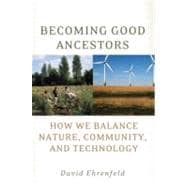
What is included with this book?
| Preface | p. ix |
| Bookmap | p. xiii |
| In Search of Honesty | |
| Pretending | p. 3 |
| Brainstorming Has Its Limits | p. 18 |
| Nothing Simple | p. 22 |
| The Comforts of Fantasy | p. 27 |
| Keeping Track of Our Losses | |
| Rejecting Gifts | p. 37 |
| The Uses and Risks of Adaptation | p. 42 |
| When Machines Replace People | p. 47 |
| Pseudocommunities | p. 51 |
| Obsolescence | p. 58 |
| Accelerating Social Evolution | p. 63 |
| Writing | p. 69 |
| Toward a Sustainable Economics | |
| Affluence and Austerity | p. 77 |
| Energy and Friendly Fire | p. 82 |
| Durable Goods | p. 87 |
| Preserving Our Capital | p. 91 |
| Conservation for Profit | p. 97 |
| Hot Spots and the Globalization of Conservation | p. 106 |
| Putting a Value on Nature | p. 121 |
| The Downside of Corporate Immortality | p. 127 |
| Relating to Nature in a Human-Dominated World | |
| Wilderness as Teacher | p. 137 |
| An Opposing View of Nature | p. 141 |
| Death of a Plastic Palm | p. 147 |
| Scientific Discoveries and Nature's Mysteries | p. 151 |
| I Reinvent Agriculture | p. 157 |
| Thinking about Breeds and Species | p. 163 |
| Strangers in Our Own Land | p. 169 |
| Teaching Field Ecology | p. 176 |
| The Ubiquitous Right-of-Way | p. 181 |
| A Walk in the Woods | p. 186 |
| Old Growth | p. 190 |
| Intimacy with Nature | p. 196 |
| Restoring the Community | |
| The Utopia Fallacy | p. 203 |
| Traditions | p. 210 |
| Jane Austen and the World of the Community | p. 216 |
| Universities, Schools, and Communities | p. 222 |
| What Do We Owe Our Children? | p. 229 |
| Epilogue: A Call for Fusion and Regeneration | p. 240 |
| Notes | p. 259 |
| Credits | p. 291 |
| Index | p. 293 |
| Table of Contents provided by Ingram. All Rights Reserved. |
The New copy of this book will include any supplemental materials advertised. Please check the title of the book to determine if it should include any access cards, study guides, lab manuals, CDs, etc.
The Used, Rental and eBook copies of this book are not guaranteed to include any supplemental materials. Typically, only the book itself is included. This is true even if the title states it includes any access cards, study guides, lab manuals, CDs, etc.